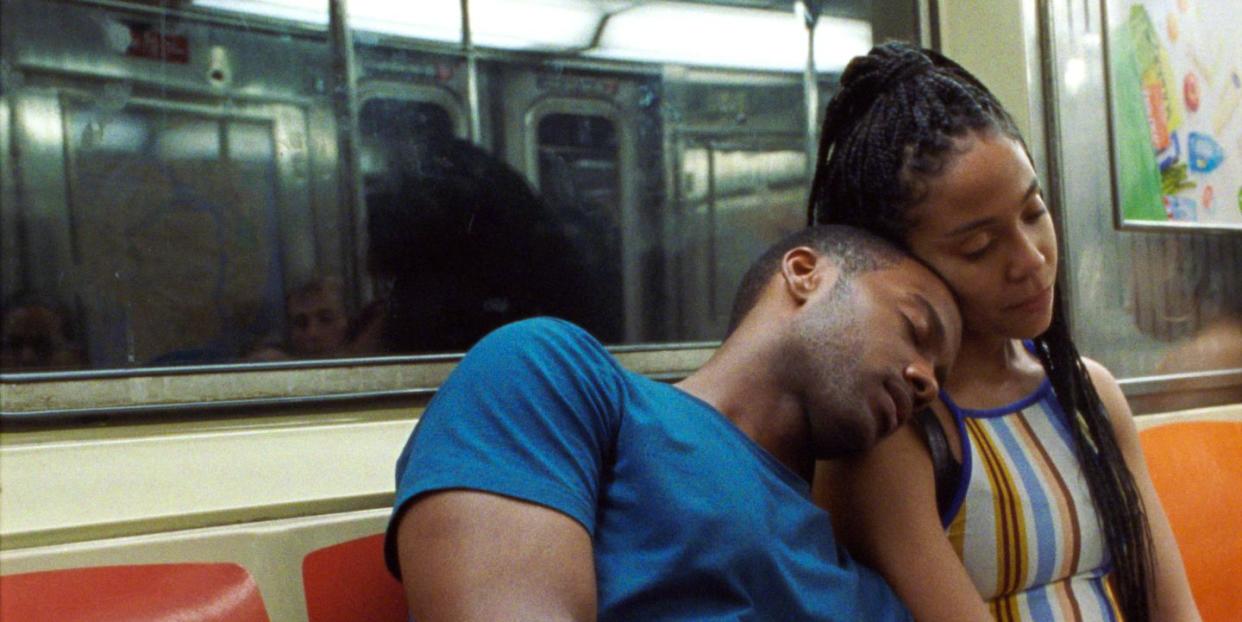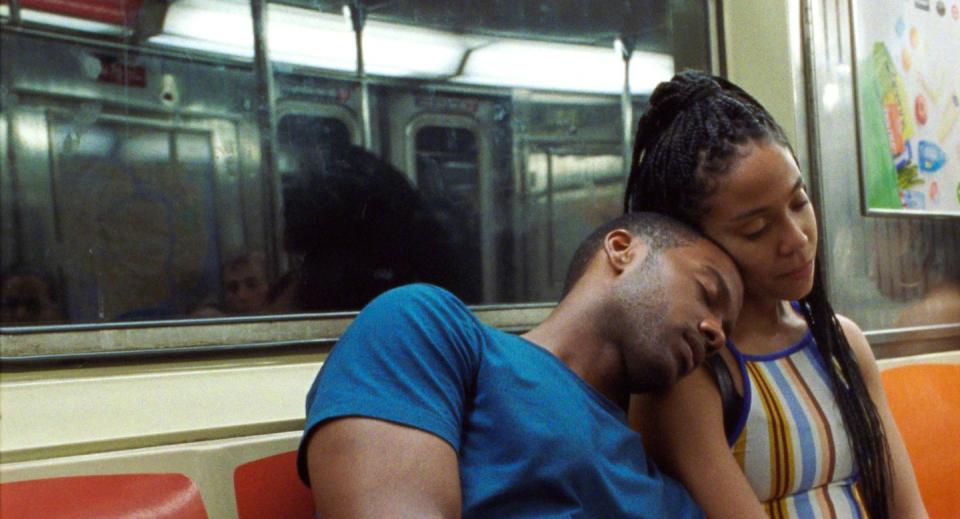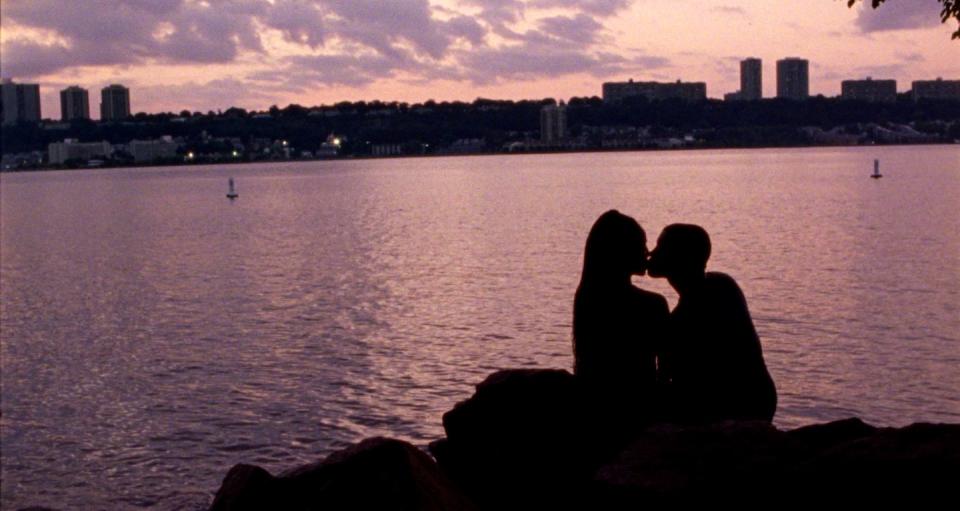'Premature' Is a Coming-of-Age Love Story That Puts Its Heroine First

"I've always felt that I'm here to tell stories," Zora Howard says of finding the courage to co-write and star in her first film, Premature. Her collaboration with co-writer and director Rashaad Ernesto Green was more than a decade in the making: Green cast Howard in a small role in his directorial debut, 2011's Gun Hill Road, and she wrote poetry for that film. Now, she plays a poet on the cusp of adulthood in Premature, a beautifully complex first love story set that grew out of the trust between Howard and Green. "So much of [our] writing process was sitting in a room and sharing stories," she says.
The film follows 17-year-old Ayanna (Howard) throughout the pivotal summer before she heads off to Bucknell College. Like Howard, Ayanna is a young New York City poet writing her way towards her own sense of freedom. When she meets and falls hard for Isaiah (Joshua Boone), a fellow artist also struggling to find his voice, the two grow together and evolve individually, and their relationship is continually tested.
Premature is the kind of confident, remarkably vulnerable drama to which even veteran storytellers aspire. For Howard, returning to her youth through Ayanna’s story helped crystallize those experiences, and put her relationship with her own mother into perspective. And working alongside Green gave her a new platform to articulate what it really means to be young, black, and free. Howard talks to ELLE.com about the pressure of a leading role, the urgency of being a black storyteller today, and taking her poetry from the pad to the screen.
This is your first feature role and your first feature writing credit. What made you take such an enormous leap?
At the time, it didn't feel like a leap. It felt like what I've done my entire life, which is create. It wasn't my first time being on a film set, but it was my first time leading a feature. There are a lot of eyes on you all the time, which sometimes feels great and sometimes feels very terrifying. But I've been acting as long as I've been writing, so something about that felt like home.
Where things started to feel like a leap was when there was a cut of the film and an audience. My background is primarily in theater, [where there is an opportunity] to redo the performance the next night if I didn't quite get it right. There isn't any of that in film. We spent all this time pouring into the creation of this project, and then got to the point where it was no longer ours. It's done and we have to give it away to the world.

Poetry is inherent to the film’s story. Why was it important for you as a poet to incorporate that into the character and the script?
That's the way I think about writing. It's my entry point. I write things that are intended to be spoken aloud and shared. That includes the flow of the dialogue and even how we describe and set the scenes. [Rashaad and I] knew early on that Ayanna was a writer, but I was actually quite resistant to having any poetry in the film. There was no verse written into the script.
There’s a scene where Ayanna is about to share her poetry with Isaiah for the first time. As it's written in the script, she just opens her mouth, and then we cut to another scene. But when we were shooting the scene, Rashaad was like, “Why don't you say a little poem? It might be good for editing, to cut back and forth to see her mouth moving.” I said something that I had memorized, then the first cut of the film had that entire poem. Our editor, Justin Chan, really made it work. [But] that was the only moment with poetry in the film, which didn't feel right. So during the editing process, we went back and I wrote some poems so we can hear from Ayanna. We hear more of her inner emotions and what she's thinking, but she doesn't speak so much. We wanted to get deeper into Ayanna’s mind. Now I can't imagine the film without poetry.
When did you know you had something to say as an artist?
I can't remember a time when I didn't think I had something to say. I owe that to the family I grew up in. My mother would be downstairs cooking while me and my cousins were upstairs putting together little performances, like cabarets. My grandma, my aunts, my uncle, everybody would be downstairs, and we’d go down and do our little presentation. In my parents’ house, there are books and books. They're both avid readers and I grew up loving to read. I think that love for reading quickly turned into a love for writing. I think I get the theatrical piece from my mama [Laughs]. Then of course, it only encourages you when people respond positively. I don't know how good I was back then. Sometimes I don’t know how good I am now. But when the response is positive, you feel affirmed. And that's a blessing. I know that's not the case for many.
Did returning to this very crucial era of young adulthood—a black teenage girl in Harlem post-high school, on the cusp of college—provoke any memories from your own youth?
Absolutely. There’s something so special about being 17, because you're so close to the beginning of it all, but you’ve got one foot in your mama's house and one foot on the edge of the world, and the stakes are incredibly high, especially when it's the first time you leave home and get to make choices for yourself. There's a lot of joy in returning to that place because things were easier. You were so full of life and you remember that first love, but then you also remember that first heartbreak, and how unnecessarily high the stakes were, and how you thought you knew everything. You can look back now and see how little you actually did know. Rashaad also loved somebody for the first time in New York City. We know about these New York City summers and what it meant to have a little tiny bit of freedom from your parents.
Ayanna's relationship with her mother is wonderfully complex. It evokes the very specific relationship between a black single mom and a daughter who’s also facing motherhood. What were the notes you wanted to hit on those moments between them?
Just how complicated and dynamic that love is. We talk about this being a love story between Ayanna and Isaiah, but it's also a love story in other ways. There’s the familial love, what it means to love your mother, especially at 17 when you are defining what it means to be a woman and how you want to follow [your mother] or walk in a different direction. I felt that in a very real way as a teenager, seeing the woman that my mother was and the decisions she made in her life. I didn't want that for myself because I didn't fully understand, and that's okay.
You see it from both sides: Ayanna gets how her mother's life is and she's able to say she doesn’t want that. The same thing for Ayanna’s mother, who sees how her daughter has a sense of what she wants based on the experiences she's had. What I really wanted to hit on in the movie was how that is broken down for both of them. They get to see each other anew based on this experience that they grow from together. It's been [Ayanna and her mother] all this time in that apartment, and she's about to leave the biggest caretaker she's known to be on her own. There's a mourning of that separation that neither is really articulating.
We see it in that scene when they're in the kitchen and they fall into each other’s arms. That's so real between black women sometimes. I know I definitely feel it with my mother. There's so much to express, and sometimes we don't have the words. There's no big monologue between Ayanna and her mother. A lot of it is unspoken. That's a tricky thing to try to represent onscreen, but we didn't want there to be a second that anybody saw this film and doubted how deep and real the love is between Ayanna and her mother and how much they need each other.

Much of your screen and stage work, including the recent off-Broadway production of Stew, deals with a sense of what characters should do versus what everyone else wants them to do. Is that something you're also scratching at, even outside of your art?
Absolutely. As a creator, a thread that goes even deeper is freedom. As a black woman living in this world, the question for me is always, How do I be free? I think that is the quest Ayanna is on. It is contained in a love story, but it is really the self-love that she doesn't know at the beginning of her journey that she's after. And there's freedom in that.
In Stew, four women of three different generations in [one] family contemplate the choices they've made in their lives and that they have left to make in the pursuit of freedom. For many people, the freedom to make a choice is no big thing. But I think for black people living in this country in this time—and all time, really—that choice comes with very high stakes. I want to be free, and I want us all to be free. My art is always going to investigate how we do that. How do we strategize? What are the conversations we need to have and what are the actions we need to take? I don't have all the answers. I'm trying to get to the answers through what I create.
Premature is available to watch on Amazon Prime now. Rent the Movie
You Might Also Like

